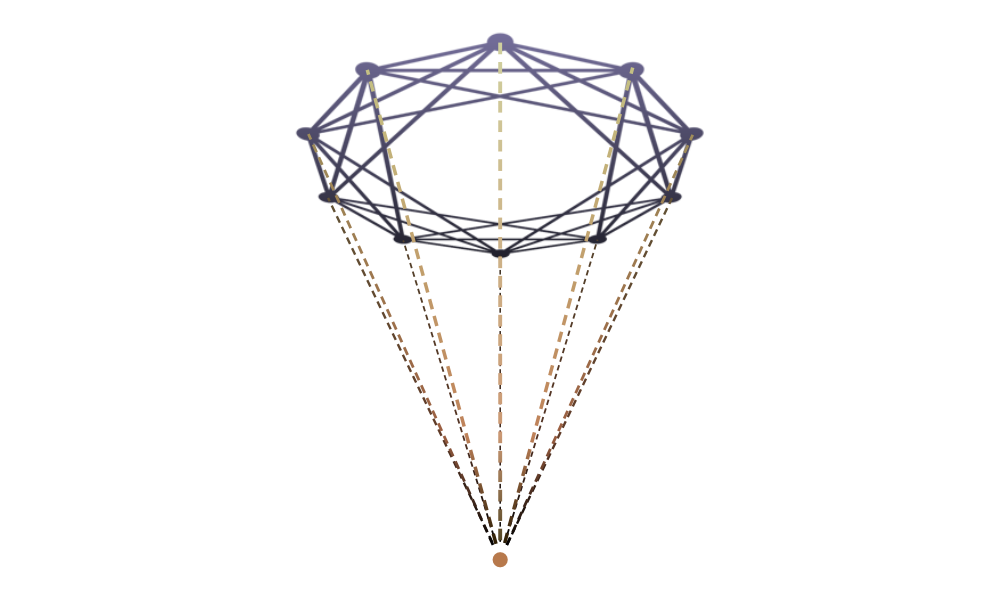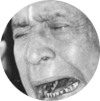One of the most important concepts from set theory, which informs my approach to meditation and consciousness, is surjection. Surjection describes a transformation between two sets, in which many points map to single points: a many-to-one relation, a reduction of complexity. In both psychoanalysis and the fundamental causation theories of physics, this is known as "overdetermination". It also happens to be the only sane model for the relation between unconscious and conscious process: a conscious topology is densely packed, multivalent, uncanny. People always mean more than they explicitly say: just as any given apperception is a radical simplification. When we meditate, we are narrowing our focus and amplifying the recursive function of apperceptive consciousness, so that we get a mysteriously undulating surface which always implies more than it specifies: much of the art of insight is to pay more attention to the undulation than the surface - therein are the latent variables, and thus the interesting data. Just so, in narrative consciousness it is often the sequence of words, the omissions, the phrasing, the timing, the context which reveals much stronger valences of intention than any explicit semantic digestion - the much lauded "natural language processing" of machine learning, for example, consistently fails to map sentiment on any dimension greater than one: as though emotional valence could ever conceivably be so shallow as to fit through a "positivity filter"...
When we meditate, we watch this undulating surface of perceptions, fragmentary thoughts, urges, itches, memories, unfinished arguments: it's like sitting on a street corner of Manhattan observing pedestrian traffic. There's two sentences of one side of a tense phone conversation, there's the smirking suit thinking of his bank account, there's the 20-something hottie enjoying the bubble of distraction she creates, there's the dog walker looking bored, there's the tourist looking stupid... Each case represents the media res of a long story, a mere fragment which is legible only to the degree that one's imagination and experience transforms it into a probable history: just so, every distracting thought in meditative practice is a rambling story, which has its own valid reasons for being. Proper technique neither indulges the talkative mind, nor suppresses it: we have to learn to grow up and stop indulging every urge, yet we also have to respect ourselves enough to forgive ourselves for being so compulsive, frayed, pathetic. Meditation is the great confrontation with what we really are: an anxious wreck, an obsessive little shit, a resentful arse, a rebel without a cause, an arrogant bore, a tired drone, a desperate loner - we have all been these things and more. None of us is alone in the cause célèbre of modern wretchedness: the proliferation of consolations for chronic anxiety should teach us that much. But rather than make it worse through endless consolation - indulgent psychotherapy, spa treatments for the soul, pharmacological narcosis, guilt-laden consumerism smeared with political pretension, the cargo cult narcissism of social media - we recommend rather the old-fashioned approach: poised discipline. A basin of attraction in critical emergent systems has the odd ability to reverse the attraction-repulsion factor as distance varies: a strange attractor should be properly named an "attractor-repulsor". At close range, a critical moment behaves like a steep ridge, discarding approaching trajectories. At wide range, the same moment draws in distant paths: this has been my experience with disciplines and excellence in all fields. The closer you come to mastery, the further it recedes and the steeper the path. Meditative discipline as I conceive of it, is the practice of excellence distilled to its core: we just sit there, breathing, trying to not be such an impulsive coward. The rewards of the practice therefore, apply in every scenario: everything the body does can be construed as a function of emergence through constraint, metabolic efficiency, dissipative flow. The more advanced students of philosophy will probably recognize in my writing method, more than a hint of the Nietzschean pedagogy: the trick is to allow playfulness even while shepherding the flock toward some distant goal. Nothing else yields the feeling of a genuine conversation with a genuine soul: old Fritz composed most of his best material while walking, and it shows. Beware all thought born of "Sitzfleisch", he says: odd then, that I'm comparing sitting meditation to Nietzschean excursions? But this is my point: proper meditation is a virtual journey, because we cannot stop the spirit from wanting to wander, we can only learn to compose it, to gently contain it, to amplify excursion into recursion, to wait patiently for the return, to watch ridge become valley, to trust the undulations of a neurochemical bath and learn precision and poise in place of stasis and fear. The surface of consciousness represents potential, not result.



